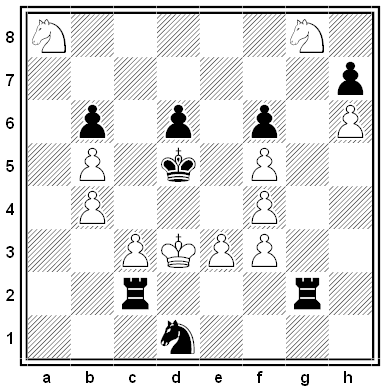
A backward chess puzzle by Karl Fabel. What moves must White play to avoid winning?

A backward chess puzzle by Karl Fabel. What moves must White play to avoid winning?
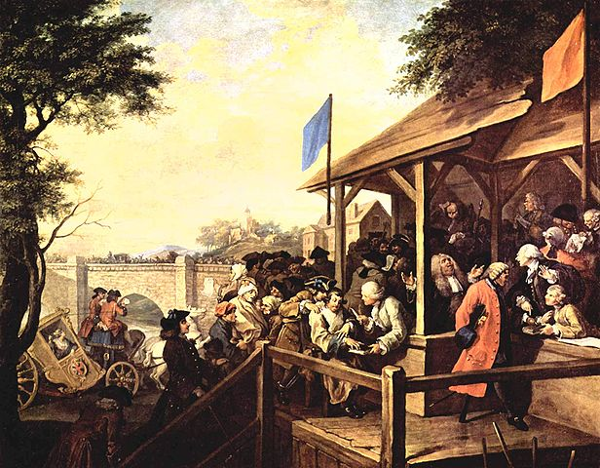
If you and I are both well-informed, rational, morally reasonable people, then we should both have the right to vote for our leaders. But what if I’m incompetent, misinformed, or irrational? My vote exerts political power over you — it appoints people to powerful offices and influences the coercive power of the state.
Georgetown University philosopher Jason Brennan argues that, as an innocent person, you should not have to tolerate this. Citizens have the right that any political power held over them should be exercised competently, and giving the vote to everyone violates this right. He advocates replacing democracy with a moderate “epistocracy,” a system in which suffrage is limited to politically competent, well-informed citizens, perhaps through a voter qualification exam. There are objections against this view, but Brennan argues that it’s less intrinsically unjust than our present system and probably produces more just outcomes.
“Just as it would be wrong to force me to go under the knife of an incompetent surgeon, or to sail with an incompetent ship’s captain,” he writes, “it is wrong to force me to submit to the decisions of incompetent voters. People who exercise power over me, including other voters, should have to do so in a competent and morally reasonable way. Otherwise, as a matter of justice, they ought to be excluded from holding political power, including the power to vote.”
(Jason Brennan, “The Right to a Competent Electorate,” Philosophical Quarterly 61:245 [October 2011], 700-724.)
“Talk sense to a fool and he calls you foolish.” — Euripides
“The truest characters of ignorance / Are vanity, and pride, and annoyance.” — Samuel Butler
“Wise men learn more from fools than fools from the wise.” — Cato the Elder
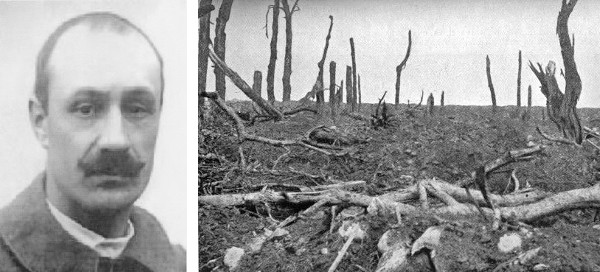
A quarter million Frenchmen vanished in World War I, leaving their families no clue whether they were still alive. During these anxious years, a lone man appeared on a Lyon railway platform without memory, possessions, or identification. In this week’s episode of the Futility Closet podcast we’ll tell the strange story of Anthelme Mangin, whose enigmatic case attracted hundreds of desperate families.
We’ll also consider some further oddities of constitutional history and puzzle over an unpopular baseball victory.

Is it rational to believe in the existence of a superior being? In 1982, New York University political scientist Steven J. Brams addressed the question using game theory. Assume that SB (the superior being) chooses whether to reveal himself, and P (a person) chooses whether to believe in SB’s existence. The two players have the following goals:
SB: Primary goal — wants P to believe in his existence. Secondary goal — prefers not to reveal himself.
P: Primary goal — wants belief (or nonbelief) in SB’s existence confirmed by evidence (or lack thereof). Secondary goal — prefers to believe in SB’s existence.
These goals determine the rankings of the four outcomes listed above. In each ordered pair, the first number refers to SB’s preference for that outcome (4 is high, 1 is low), and the second number refers to P’s preference. For example, SB prefers the two outcomes in which P believes in SB’s existence (because that’s his primary goal), and of these two outcomes, he prefers the one in which he doesn’t reveal himself (because that’s his secondary goal).
Brams finds a paradox here. If the game is one of complete information, then P knows that SB prefers not to reveal himself — that is, that SB prefers the second row to the first, regardless of P’s choice. And if SB will undoubtedly choose the second row, then P should choose his own preferred cell in that row, the second one. This makes (2, 3) the rational outcome of the game; it’s also the only outcome that neither player would choose unilaterally to depart once it’s chosen. And yet outcome (3, 4) would be preferred by both to (2, 3).
“Thus,” writes Brams, “not only is it rational for SB not to reveal himself and for P not to believe in his existence — a problem in itself for a theist if SB is God — but, more problematic for the rationalist, this outcome is unmistakably worse for both players than revelation by SB and belief by P, which would confirm P’s belief in SB’s existence.”
(Steven J. Brams, Superior Beings, 1983. This example is drawn largely from his paper “Belief in God: A Game-Theoretic Paradox,” in International Journal for Philosophy of Religion 13:3 [1982], 121-129.)

Can time exist without change? Aristotle thought not, and David Hume claimed that “’tis impossible to conceive … a time when there was no succession or change in any real existence.” But in 1969 Cornell philosopher Sydney Shoemaker offered a thought experiment that purports to show otherwise.
Consider a universe that consists of three regions, A, B, and C. Periodically a region might experience a “local freeze” in which all processes come to a halt. The inhabitants of a frozen region do not observe the passing of time but resume their awareness at the end of the freeze.
With experience, the inhabitants determine that each freeze lasts exactly one year and that the freezes occur at regular intervals: Region A freezes every third year, Region B every fourth year, and Region C every fifth year. This suggests that all three regions freeze every 60th year.
Shoemaker wrote, “If all of this happened, I submit, the inhabitants of this world would have grounds for believing that there are intervals during which no changes occur anywhere.” It’s true that none of the inhabitants would be able to verify this directly, but given the regularity they observe in the local freezes, the reality of the total freeze seems to be the simplest hypothesis.
Whatever we think of this argument, the example does run into one sticking point: It’s hard to see how a total freeze could end. If nothing in the universe is changing, it seems, then there can be no causes.
(Sydney Shoemaker, “Time Without Change,” Journal of Philosophy 66:12 [June 19, 1969], 363-381.)
Ian Fleming never describes James Bond’s physical appearance in any detail, so in December 1962, before the release of the first Bond film, Dr. No, Playboy art director Arthur Paul sent an inquiry to his office. He received this reply:
Dear Mr. Paul,
As Mr. Fleming is away from London I sent him your letter and here now is his description of James Bond:
Height: 6 ft 1 in.
Build: Slim hips, broad shoulders
Eyes: Steely blue-grey
Hair: Black, with comma over right forehead
Weight: 12 stone 8 lb.
Age: Middle thirtiesFeatures:
Determined chin, rather cruel mouth.
Scar down right cheek from cheekbone.
CleanshavenApparel:
Wears two-button single-breasted suit in dark blue tropical worsted. Black leather belt.
White Sea Island cotton shirt, sleeveless.
Black casual shoes, square toed
Thin black knitted silk tie, no pin
Dark blue socks, cotton lisle.
No handkerchief in breast pocket
Wear Rolex Oyster Perpetual watchI hope this information is sufficient for your purpose.
Yours sincerely,
[unsigned]
Secretary to Ian Fleming
From Henry Chancellor, James Bond: The Man and His World, 2005.
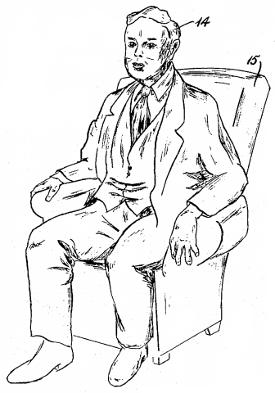
Here’s an odd invention from 1960, a “device for stimulating the mental processes,” patented by Darrell M. Johnson of Thomson, Ga. Johnson wanted to help people in creative but solitary occupations who feel inhibited “before a microphone, telephone, television camera or in other stimuli-lacking situation, or where the psychological environment is of a character to create tension and dissipate thought and concentration and thereby dispel the ability to create ideas.”
The answer, Johnson decided, is a lifelike human figure that seems to respond with intelligent interest when it detects a sound. The eyes glow and the eyelids move to create the impression of an active, encouraging listener. The dummy “may be inanimate but may be animated to portray a feeling of life, participation, and cooperation to thereby stimulate expression relative to the topic or subject under consideration with resultant improvement and intensity of such expression.”
Even outside a professional situation, users might find it helpful “when alone to obtain the resultant benefits as well as the release of pent up feelings, accompanying tensions, and emotions and the satisfaction obtained from such expression.” Here as elsewhere, I get the feeling that there’s a real human story behind this, but I suppose we’ll never know what it is.

Central Hudson Rail Road train No. 9 was roaring from Buffalo to Lockport, New York, with about 200 passengers when lightning prevented a train wreck in 1894. It was a dark rainy night and Engineer Schaffer squinted to see past the limited beam from his locomotive’s headlight. He could only see about 50 yards ahead. Suddenly a flash of lightning, followed by a loud clap of thunder, lit up the track a half mile ahead. Schaffer saw a sight that made him grab the reverse lever and call to the fireman to put on the brakes. The wheels screeched and the train came to a halt with the cowcatcher just one foot from the caboose of a stalled freight train. Railroad men claimed that the flash of lightning was all that saved the lives of the passengers.
— Peter Viemeister, The Lightning Book, 1961
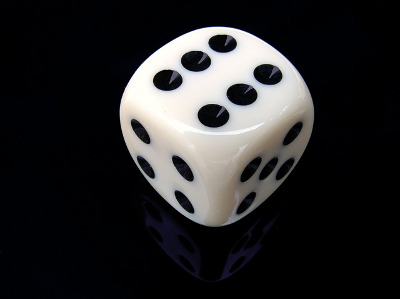
A fair die bearing the numbers 1, 2, 3, 4, 5, 6 is repeatedly thrown until the running total first exceeds 12. What’s the most likely total that will be obtained?